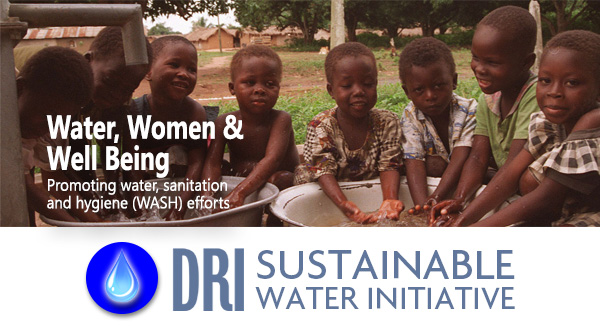DRI launches global initiative to provide women and
children in developing countries with clean water
Imagine a day in which your access to clean, drinkable water ceased and you could not shower or bathe properly and you had no one to help you. For more than 783 million people around the world, that day was today. In 2015, more than 2.5 billion people also lack access to basic sanitation in the developing world.
A new initiative led by Nevada’s Desert Research Institute (DRI) is aiming to dramatically reduce those numbers, focusing specifically on women – who often bear the brunt of the impact from lack of access to safe water; and in some parts of sub-Saharan Africa walk up to four hours per day, on average, to carry clean water back to their villages and families.
As part of DRI’s Global Water Knowledge Campaign, this new initiative builds on more than 20 years of water research that DRI scientists have done in West Africa. Through a generous challenge-grant investment from two long-time DRI Foundation leaders, donations to this global campaign will support four primary objectives –
- The provision of safe drinking water and basic sanitation services
- Creation of WASH education materials for women and girls in developing countries
- Training of WASH staff working in developing countries
- Applied water research and student education at DRI, ensuring that WASH projects are sustainable and scalable in developing countries.
The DRI Sustainable Water Initiative is a unique, international collaboration with WaterAid, Water for People, and World Vision. Collaboratively, these three world renowned organizations currently have water, sanitation, and hygiene (WASH) programs in more than 41 countries.
Leading this new initiative is Dr. Braimah Apambire, a native of Ghana, West Africa, who serves as director of DRI’s Center for International Water and Sustainability.
The impact of unsafe water, and inadequate sanitation and hygiene is felt around the world, with both human health and economic implications. In places like sub-Saharan Africa a significant percentage of the population is at risk of dying from preventable illnesses, many of which are linked to WASH issues.
More than 500,000 children die every year from diarrhea caused by unsafe water and poor sanitation – that’s over 1,400 children per day. Diarrhea is the second biggest killer of children under five years old in sub-Saharan Africa. In economic terms, 5.6 billion productive work days are lost every year due to complications arising from water-related diseases and the burden of fetching water.
An investment in the DRI Sustainable Water Initiative will help save lives and support improved health and socioeconomic outcomes, especially for women and children, in the developing world.
For more information about DRI’s Sustainable Water Initiative and to support this important effort please visit – https://dri-water.charity.org/



I wanted to get involved with something about northern Nevada. I met somebody who suggested I contact a person associated with this website. And, regrettably, I find this. Why don’t you just bring all the African women and children to Reno and give ’em as much clean water as they can use? Hey, we’ll all just pick up the check for your feel good project. Oh, do we have our own water problems? Oh, I didn’t know that the absence of clean drinking water could even —at the outer limits of human reason — be considered a problem that mostly impacts women and children. If Africa has societies where men drink clean water and everyone else drinks fetid water then there is absolutely nothing any American can do to improve that society,